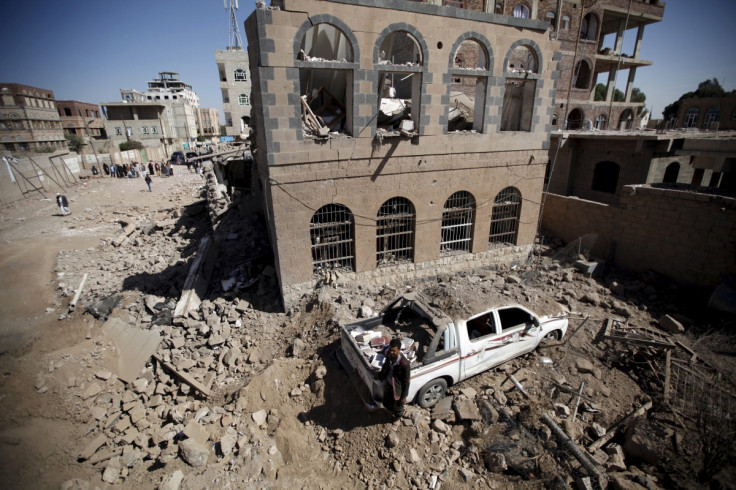Yemen: Briton killed leading secret Latino legion of mercenaries shines light on murky world of 'dogs of war'

British authorities are struggling to identify a Briton who has reportedly been killed fighting for the Saudi-led coalition against Iranian-backed Houthi rebels in Yemen.
Houthi media reported last week that Colonel Arthur Kingston had been killed, alongside an Australian, Philip Stitman, and five Colombians near the Yemeni city of Taiz, with speculation that the former army officer was a mercenary working for the United Arab Emirates.
The UAE is believed to have an 800-strong force of mostly Latin American soldiers fighting in Yemen, where it is a major player in the Saudi-led campaign against the Houthis, and military sources told the Times last week that Kingston had been leading Colombian troops in an attempt to capture the al-Amri military base.
The New York Times reported as far back as 2011 that the UAE had amassed a private army of mostly Latin American fighters in a camp near Abu Dhabi but the wealthy Gulf petro-state has never admitted having the force or sending mercenaries to Yemen.
But a week since the news broke neither the Ministry of Defence nor the Foreign and Commonwealth Office have any information about Kingston. The FCO told IBTimes UK that it was still working to establish the accuracy of the reports while the MoD said it had no record of a British Army soldier by that name.
The GCC states have small armies with a lot of advanced Western military equipment, while the military is not necessarily a preferred occupation. Trained foreign soldiers solved this issue.
Meanwhile, a spokesman for the UAE Ministry of Foreign Affairs told IBTimes UK to contact the country's state media outlet, WAM, which did not respond for requests for comment. It could be that Kingston is a nom de guerre, designed to protect the former British officer's identity and therefore difficult to trace.
The affair has highlighted the murky world of private military contractors and so-called soldiers of fortune, who played a prominent role in the wars in Afghanistan and Iraq as well as in numerous conflicts in the Middle East and Africa. Many military contractors work for major firms, such as Blackwater – now known as Academi – the US contracting giant that provided thousands of guns-for-hire in the aftermath of the Iraq War.
The US government increasingly relied on private contractors as the occupation in Iraq descended into the bloody chaos of 2006 and 2007 but the role of mercenaries in foreign wars has been controversial, not least because of questions over their culpability and accountability and several high profile scandals.
The Houthi-controlled SABA News Agency has previously referred to pro-government fighters killed in Yemen as "Blackwater company forces" but there has never been official confirmation that the firm founded by billionaire Erik Prince is linked to the UAE private army project. In documents leaked to the New York Times in 2011, the company signing the initial contract with the UAE authorities was called Reflex Responses (R2).
But Blackwater aside, analysts say that it would not be unusual for the UAE to be using soldiers of fortune in Yemen. Despite being a major buyer of US and British made weapons, the UAE has a local population of around two million and only a small professional army. The country has typically relied on Pakistani, Yemeni and African immigrants to staff its police force and fire service and has used foreign mercenaries as soldiers in the past.
Miriam Goldman, director of intelligence at the Tel Aviv-based Levantine Group, said: "The use of mercenaries is not particularly new in the GCC [...]. Back in 2011, [...] Colombians, along with other foreign nationals, were described as being part of this project [...]. Generally and traditionally speaking, the GCC states have small armies with a lot of advanced Western military equipment, while the military is not necessarily a preferred occupation. Trained foreign soldiers solved this issue and have largely been seen as reliable."
Critics also point to the fact that the presence of foreign forces in Yemen plays into the Houthi narrative of the conflict, which has already seen some 5,800 people killed, as an attempt to re-install a Saudi-sponsored puppet leader in former president Mansour Hadi. The presence of foreign fighters and particularly those that can be even tenuously linked to Blackwater, only reinforces the argument that the Houthis represent a popular uprising.
A ceasefire between the Saudi-led coalition and the Houthi rebels came into force on December 15 as peace talks began between the warring factions in Switzerland. The eight-month conflict has seen thousands of civilian deaths and widespread condemnation of coalition bombing of civilian areas. Meanwhile, al-Qaeda in the Arabian Peninsula and Islamic State (Isis) have seized swathes of the country, one of the Middle East's poorest.
© Copyright IBTimes 2025. All rights reserved.






















